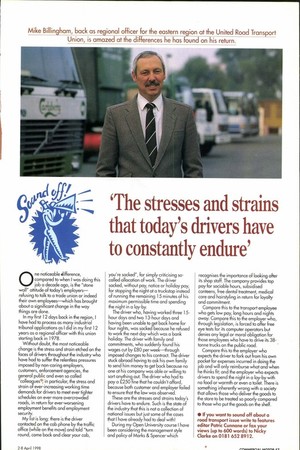The stresses and strains that today's drivers have to constantly
Page 63

If you've noticed an error in this article please click here to report it so we can fix it.
endure' One noticeable difference, compared to when I was doing this job a decade ago, is the "stone wall" attitude of today's employers— refusing to talk to a trade union or indeed their own employees—which has brought about a significant change in the way things are done.
In my first 12 days back in the region, I have had to process as many industrial tribunal applications as I did in my first 12 years as a regional officer with this union starting back in 1978. Without doubt, the most noticeable change is the stress and strain etched on the faces of drivers throughout the industry who have had to suffer the relentless pressures imposed by non-caring employers, customers, enforcement agencies, the general public and even so called "colleagues', in particular, the stress and strain of ever-increasing working time demands for drivers to meet ever tighter schedules on ever-more overcrowded roads, in return for ever-worsening employment benefits and employment security. My list is long: there is the driver contacted on the cab phone by the traffic office (while on the move) and told "turn round, come back and clear your cab, you're sacked", for simply criticising socalled allocation of work. The driver sacked, without pay, notice or holiday pay, for stopping the night at a truckstop instead of running the remaining 15 minutes of his maximum permissible time and spending the night in a lay-by. The driver who, having worked three 15hour days and two 13-hour days and having been unable to get back home for four nights, was sacked because he refused to work the next day which was a bank holiday. The driver with family and commitments, who suddenly found his wages cut by £80 per week—through imposed changes to his contract. The driver stuck abroad having to ask his own family to send him money to get back because no one at his company was able or willing to sort anything out. The driver who had to pay a £250 fine that he couldn't afford, because both customer and employer failed to ensure that the law was observed.
These are the stresses and strains today's drivers have to endure. Such is the state of the industry that this is not a collection of national issues but just some of the cases that I have already had to deal with!
During my Open University course I have been considering the management style and policy of Marks & Spencer which recognises the importance of looking after its shop staff. The company provides top pay for sociable hours, subsidised canteens, free dental treatment, medical care and hairstyling in return for loyalty and commitment.
Compare this to the transport employee who gets low pay, long hours and nights away. Compare this to the employer who, through legislation, is forced to offer free eye tests for its computer operators but denies any legal or moral obligation for those employees who have to drive its 38tonne trucks on the public road. Compare this to the employer who expects the driver to fork out from his own pocket for expenses incurred in doing the job and will only reimburse what and when he thinks fit; and the employer who expects drivers to spend the night in a lay-by with no food or warmth or even a toilet. There is something inherently wrong with a society that allows those who deliver the goods to the store to be treated so poorly compared to those who put the goods on the shelf.
























































































































